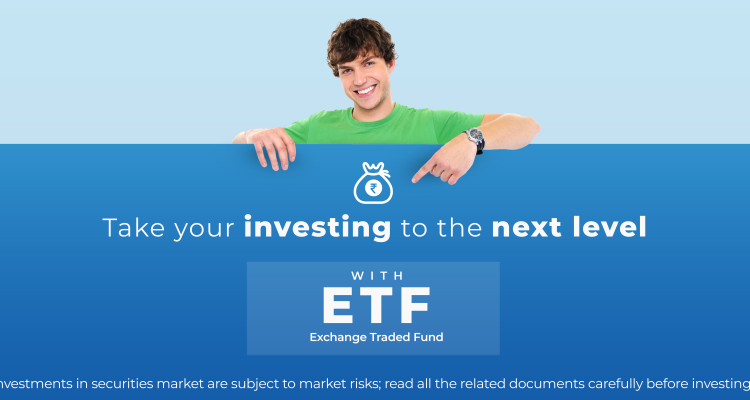New investors setting foot in the equity markets are more likely to find themselves overwhelmed and perplexed. The market can be such a place, especially for beginners. The equity market isn’t a serene or simple place in any sense. A lot goes on & affects the markets daily—a lot!! An enormous amount of data and news is churned and thrown around daily. Amid this, investors can find themselves questioning – Where to begin? How to keep track? What to look for?
Equity investments are the best way to generate wealth and beat inflation. With the right investment mindset and risk management,any investor can succeed. A great starting place for you as an investor can be ETFs or Exchange-Traded Funds.
What are ETFs?
Exchange-Traded Funds are pooled investment funds that track a particular index, commodity, or basket of securities. Think of NIFTY50 – an index representing 50 of the largest Indian companies – the purpose of an ETF based on the index would be to hold all the 50 stocks in the exact proportion as that of the index. Why? The idea behind an ETF is passive management, i.e., no continuous security selection & tracking or timing of the market. You follow the index, and your returns mirror the index.
Why ETFs?
- Greater Flexibility & Liquidity:Added advantage of ETFs is their marketability. ETFs are listed and traded on the stock exchange like regular stocks. Meaning you can buy and short an ETF like a common stock during market hours – think mutual funds but with an additional perk of quick redemption via real-time NAV(Net Asset Value).
However, all ETFs mayn’t have higher trading volumes – lower buying & selling. This can lead to problems while transacting ETFs – your order may not go through. Thus, looking for an ETF with a high trading volume is the key. Additionally, a lower spread between the ETF’s price and its NAV is centralin picking out any ETF.
- Cost-Effective: As pointed out earlier,ETFs have no active management. What is active management? It’s like tracking your portfolio actively and making buy, hold, and sell decisions about its stocks/securities.It involves areas like stock analysis,research, and forecasts. Since an ETF simply replicates the index, administrative costs are minimal. This makes ETFs cost-efficient compared to an actively managed fund, thus increasing your net returns. In fact, lower expense ratios&lower tracking errors are the primary considerations when comparing similar ETFs as they are principally tracking the same underlying.
- Diversification:The primary reason why you should invest in ETFs is their diversity. Take for example an ETF based on NIFTY50; your investment would be diversified across 13 sectors and 50 diverse stocks. A diversified portfolio is less volatile compared to investing in a single stock.Since your risks&returns will be identical to the underlying index that your ETF is tracking,studying the underlying is crucial.
If you have a question, share it in the comments below or DM us or call us – +91 9051052222.
We’ll be happy to answer it.
– Nischay Avichal
















